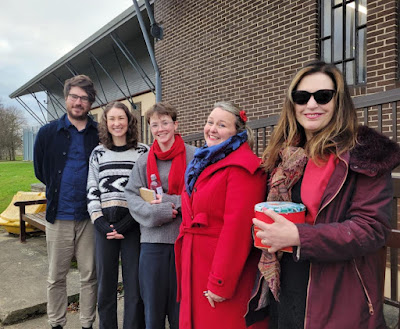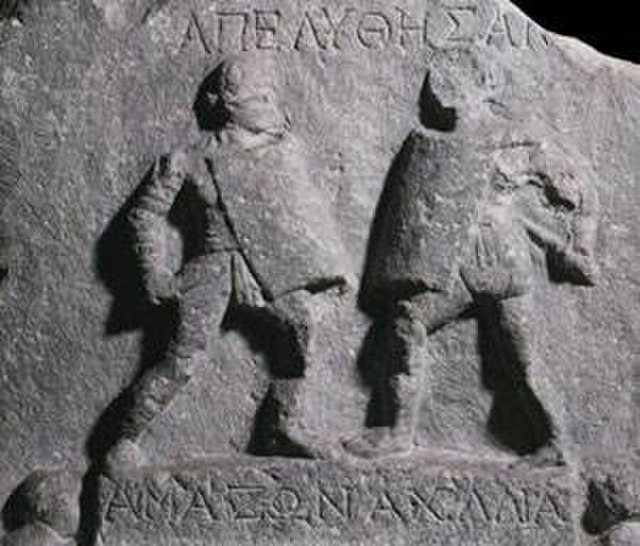The Edithorial
Saturday, 7 February 2026
Ancient Ideas and Modern Life Skills in UK Prisons
Sunday, 1 June 2025
Teaching Ancient Ethics in English Prisons: An Update
Tonight I’m driving with my colleague in all things, Professor Arlene Holmes-Henderson, to teach for a week in a prison, our PhD student Katharine Russell assisting. This is our third such institution, selected with our partner Novus Education, in nine months. We’ve honed our course in response to lucid feedback from our highly engaged and intelligent students, which you can sample on the Against the Lore Podcast.
We started out doing a general course in Classical
Civilisation/Ancient History, about half of which was practical ethics in an
Aristotelian vein. But almost all of them voted for more moral philosophy and
fewer emperors, statues and inscriptions. Everyone also LOVED performing the play.
For the men’s prisons we have already taught in, we
chose Sophocles’ Philoctetes, basically the story of a guiltless man
stuck in solitary confinement for a decade by cruel and perfidious ‘comrades’.
The discussions after the (outstandingly vigorous) performances led by Drs
George Gazis and Rosie Wyles, have addressed rage, revenge, despair, sticking
to principles and the difficulties men have sorting out power hierarchies in
institutions like armies…and prisons.
 |
| With Rosie, Katharine and Arlene |
This week is our first women’s institution, and we are
doing Antigone. Standing up to horrible patriarchs, unjust punishments,
bereavement, loyalty to family, problematic sisters, suicide… I’ll have more to
report on that next week.
Teaching these students is emotionally exhausting. The
whole process is making me more than ever convinced that our current penal
system is inappropriate to the point of lunacy. A huge proportion of our (voluntary)
attendees were in care as children and thrust out to fend for themselves at 18.
They are bored out of their minds, often locked up in cells for 20 or more
hours a day, with only the brain-wrecking daytime TV for stimulation.
Learning to cook or plaster walls for a living--courses to which most prisoners do have access--doesn’t feed the intellect, the imagination or the soul. What Aristotle offers is help with planning how to become the best version of themselves that they would have been if their potential and teleological journey to self-fulfilment had not been derailed by inadequate or non-existent love, approval, education, guidance and/or stimulation in childhood and adolescence.
Sunday, 20 April 2025
Review of Dan Mendelsohn's Translation of the ODYSSEY
Homer’s Odyssey is the most
familiar work of ancient literature besides Aesop’s Fables. It has been
translated into most world languages and transformed into countless operas,
plays, novels, poems, paintings and video games. Its second half, narrating
Odysseus’ return to Ithaca, has recently
been made into an emotional and realistic movie filmed in Greek and Italian sea-washed
locations. Directed by Uberto Pasolini and starring Ralph Fiennes and Juliette
Binoche, its UK release is imminent. Christopher Nolan’s fantasy-action film of
the entire epic, which features Matt Damon as Odysseus, astounding special
effects, supernatural encounters with immortal nymphs and the enormous Cyclops,
is due to dazzle us next year. I hope this mass-market cultural prominence draws
attention to Dan Mendelsohn’s sonorous new
translation of the original poem.
His
rendering of the epic into its authentic metre, the dactylic hexameter, has
been keenly anticipated; in his memoir-cum-literary-interpretation An
Odyssey: A Father, a Son, and an Epic (2017), he revealed his intense
personal engagement with the story, especially Odysseus’ relationship with his
son Telemachus as the young man is initiated into Bronze Age manly protocols. Mendelssohn’s
skill as translator of Greek verse has also been demonstrated in his sensitive
translations of another admirer of the Odyssey, C.P. Cavafy (2009-2012).
Some
of his innovations, such as glossing proper names with their meanings (‘Eurýalos
Broad-Sea’), are illuminating to the Greekless reader. His metrical dexterity
comes over in the pleasing rhythms he’s found for even the most formulaic of
lines: ‘She of the bright owl-eyes, the goddess Athena, addressed him’, where
the long vowels of the spondaic ‘bright owl-eyes’ are emphasised by the
surrounding patter of dactyls.
His
translation of the Odyssey’s celebrated opening couplet is an
aesthetic manifesto in itself:
Tell me the tale of a man, Muse, who had so many roundabout
ways
To wander, driven off course, after sacking Troy’s hallowed
keep.
The alliteration (T/t, m/M, w/w), the
enjambement (continuing the phrase beyond the line-end) and the sweet variety
of emphasised vowels in the second line (a-oy-a-ee), suggestive of Ezra Pound’s
commitment to ‘tone-leading of the vowels’ in sung verse, remind us forcefully
that Homeric epic was enjoyed in oral performance accompanied by a lyre. A
comparison with the other 21st-century attempt at a hexameter Odyssey
(2002), by Rodney Merrill, a former Berkeley Professor of English, is instructive:
Tell me, Muse, of the man versatile and
resourceful, who wandered
many a sea-mile after he ransacked
Troy’s holy city.
This is far less euphonious. It also specifies
that Homer’s notoriously ambiguous epithet ‘polutropos’ means qualities
of character, where Mendelsohn’s ‘who had so many roundabout ways /To wander’
leaves the types of wandering—experiential, psychological, geographical—open to
interpretation. His shrewd decision to avoid the standard ‘city’ for the ptoliethron
of Troy reminds us that this ‘keep’ was no modern conurbation but a fortress
with high defensive walls—which Odysseus had enabled his comrades to penetrate
by the ruse of the wooden horse. Such intense intellectual activity has motored
his aesthetic choices throughout the remaining 12,107 lines. Where Merrill uses
archaisms (‘scion’, ‘no whit’, ‘hither’), and in his desire for fidelity to
Homer reproduces word order that is almost incomprehensible in English, Mendelsohn steers an impeccable course between
sounding contemporary and preserving the melancholy and grandeur of the Greek. I
would have preferred him not to capitalise the first letter of each line,
however; for the reader (though not the listener), this somewhat disrupts the
fine flow of the enjambement to which his translation is gloriously sensitive.
Mendelsohn brilliantly conveys how Homeric lines roll forward hypnotically, each arranged around six rhythmical pulses, vocalized in two clusters or asymmetrical half-lines. They have a measurable physiological impact: medical research has shown that patients’ heart and respiratory rates decelerate when they read them. Yet, since Alexander Pope’s bestseller (1725), many Odyssey translators have chosen the indigenous English iambic pentameter, including Emily Wilson in her vivid, fast-paced Odyssey (2017); Mendelsohn could have refrained in his introductory essay from dyspeptic criticism of the difficulties cramming Homeric verses into iambics without losing words. There is more than room for diverse up-to-date renderings of this timeless poem: my undergraduates love Wilson’s breezy modernity. But Mendelsohn is correct that only the dactylic hexameter can express the acoustic resonance of the original; since this metre did not relate to the predominantly iambic natural rhythm of Greek speech, Homer sounded elevated and even unearthly to his ancient audiences—an effect worth reproducing.
The
dispute about the appropriate metre for Homeric translation is centuries old. German
poets controversially attempted hexameter Odysseys in the 18th century; Goethe’s friend Vasily Zhukovsky’s Russian hexameter translation,
however, made an incalculable impression on Slavic aesthetic culture in 1849. It
was Matthew Arnold whose On Translating Homer (1861), in response to the
turgid ersatz Anglo-Saxon Iliad by UCL Classics Professor Francis Newman
(1856), made a cogent case for reviving the ancient metre. Poets including
Longfellow and Kingsley began experimenting with it in original poems, and
numerous clunky, mediocre hexameter versions of Homer soon followed.
What I feel Mendelsohn has appreciated, in the way most of them have not, is the connection between the Odyssey’s maritime content and the rolling effect of its broad-sweeping verse: as Samuel Taylor Coleridge put it in ‘The Homeric Hexameter’ (1803),
Strongly it bears us along in swelling and limitless billows,
Nothing before and nothing behind but the sky and the ocean.
When Jorge Luis Borges’ eyesight began to fail, he spoke of divining the ‘murmur of glory and hexameters…of black vessels searching the sea for a beloved isle’. The highest compliment I can pay Mendelsohn is that his translation of my favourite episode, Odysseus’ heroic swim to Phaeacia, is the most excitingly energetic I’ve ever read: Odysseus ‘Straddled a plank with his legs as if he were riding a racehorse’. He heard ‘the thundering thud of the reef as the sea crashed against it/ Since the massive swells were dashing against the shoreline, roaring /Fearfully, everything frothed with foam churned up from the sea’. I doubt that even Nolan’s movie can make this ordeal remotely as visceral and spectacular.
Saturday, 12 April 2025
Preserving Democracy & Resisting Tyranny with Aristotle
Sunday, 23 February 2025
Location Filming on Women Gladiators
A few weeks ago, Barney Rowe, a brilliant young TV producer specializing in factual history, asked if I could join his team at Tomos TV who are making a documentary about female gladiators. I’d encountered Barney through the Against the Lore podcast, which is making an episode on my work teaching in prisons, so I trust his motives completely. Amazingly, I was able to shift round things in my schedule sufficiently to find myself on Wednesday fighting for survival in something that felt like gladiatorial combat in the non-priority Ryanair queue at Luton Airport on my way to Naples.
 |
| Senatus Consultum of 19 CE |
First up, we filmed at the Samnite Museum of Campobasso, which houses an extraordinary inscription recording a decree of the Senate of 19 CE banning women of the equestrian and senatorial classes as well of men from performance on stage or fighting in the arena. The Emperor at the time, Tiberius, was keen to reinforce social class distinctions and therefore police the conduct of upper-class females.
 |
| Roman Women Entertaining themselves IN PRIVATE. From Pompeii or Herculaneum |
On day 2, I found myself driving a Volkswagen round
hairpin bends up the terrifyingly steep peak of Montecasino, with Eduardo the cameraman
sticking a camera in the back of my neck from behind my seat and a drone hovering
like a techno-mosquito in front of the windscreen. I did not dare tell the team
that I had scarcely driven since a car accident in Guernsey in 2021.
The nerve required for this hair-raising car stunt was
rewarded when we found our quarry in the museum of the monastery on the
mountain’s summit—the magnificent stone inscription which an aristocratic woman
named Ummidia Quadratilla had placed at the entrance of the amphitheatre she
had built—and funded—for her citizens. UMMIDIA QUADRATILLA BUILT THE
AMPHITHEATRE AND TEMPLE FOR THE PEOPLE OF CASINA WITH HER OWN MONEY. SUA PECUNIA FECIT. Girl-Boss or what?
 |
| At Ummidia's Inwscription with Assistant Producer Rachele Fregonese |
We know about Ummidia from her splendid Mausoleum and especially a letter by Pliny (7.24) which my colleague at Durham, Professor Roy Gibson, had briefed me on and I read, on screen, from a suitably antique-looking book kindly lent to me by Nicholas Denyer at Cambridge.
The daughter of a governor of Syria, she had inherited a fortune, which had allowed her to enjoy her taste for spectacular entertainments in the liberal days of Nero; she had a troupe of pantomime (masked ballet) dancers whom she leased out, and a large following of cheerleaders to get the audiences going.
 |
| Ummidia's Amphitheatre |
There was overlap between pantomime dancing and gladiatorial spectacle, so I got to brandish a replica pantomime mask of the helmeted Minerva similar to this one when filming at Ummidia’s amphitheatre.
It takes a village to make a TV documentary. The camera and sound men from Rome were constantly encouraging.
.jpg) |
| With Cameraman Eduardo and Sound Technician Giacomo |
The uber-competent and kind director Susannah Ward was a delight to work with. She gave us all canisters of olive oil decorated with amphitheatres when the British team—also including Barney and Rachele Fregonese, whose combined research for the documentary had been as rigorous and meticulous as any professional academics’—we reluctantly parted.
I’ve never really aspired to do TV. It is
bewilderingly hard physical work and I want to be able to go to supermarkets
without being recognized. I tried once or twice to hawk myself round ghastly
North London parties to suck up to Very Important People in the industry, but
always ended up (a) wondering why they were so up themselves and (b) drinking
with the wine-waiters in the kitchen. But these people have restored my faith
in the possibility that TV people can be excellent humans.
 |
| Parting from Susannah, Barney and Raquele at Naples Airport |
I can’t wait to see the show, which will hit history
channels and Channel 5 in due course. I dared the crew to include this oil lamp,
found in Southwark, which an article by writer and tireless supporter of Classics Caroline Lawrence, who was very generous with her time and assistance, had led me to. It shows clearly how female gladiators affected the Roman
erotic imagination. It might not be allowed on American television. But then
America is descending further every minute into a cultural desert as well as a
proto-fascist dystopia.
Sunday, 26 January 2025
My Telegraph article on Gladiators in Britain
The
brutal reality of gladiators in Roman Britain
Headless
skeletons, feral bears and female fighters – a new British Museum show
revolutionises our understanding of life in 175 AD
It’s 175 AD in Colchester – then called Camelodunum – a prosperous industrial town. Several thousand people are making their way past villas, pottery factories and temples of Jupiter and the deified Claudius to the amphitheatre. Local Britons, descended from the tribes who long ago rebelled under Cunobelinus (Cymbeline) and Boudicca, now live peacefully side-by-side with retired legionaries from Gaul, Thrace, Italy and Anatolia.
We can time-travel to these thrilling spectacles because they are illustrated on a clay vase made locally around the time of the event, which will be on display at the British Museum throughout its touring exhibition Gladiators in Britain, which opens at the Dorset Museum & Art Gallery on January 25 and travels throughout the rest of year. The vase was buried at the funeral of a middle-aged man, perhaps a deceased gladiator. The names were inscribed before the pot was fired. It was one of the more elaborate souvenirs that spectators could purchase at stalls around the amphitheatres in at least ten towns in the province of Britannia.
Gladiator culture united this
north-western extremity of the Roman Empire with hundreds of towns across the
Roman world, from Algeria to Israel, Spain to Syria. Britannia was no rustic
backwater, but a thriving and cosmopolitan civilisation receptive to all the
technology and culture that flourished under the Roman Empire.
One of the
oldest arenas was constructed at Silchester, the capital of the Atrebates
tribe, in around 75 AD. It could seat around 7,000 – a capacity midway between
the Royal Albert Hall and the O2 Arena. The clergyman William Lisle Bowles
visited it in the early 19th century, recalling, “Here
– where the summer breezes waved the wood / The stern and silent gladiator
stood, /And listened to the shouts that hailed his gushing blood.”
Gladiators of Britain runs until April 2026; further details, see: britishmuseum.org
Edith Hall is Professor of Classics at Durham University. Her
forthcoming book is Epic of the Earth (Yale, £18.99)







.jpg)








%20MOLA_0.jpg)













